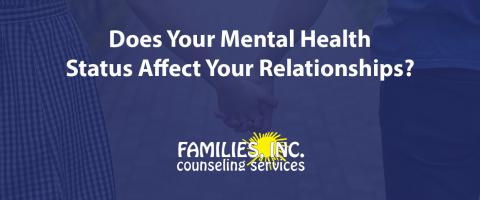
Your mental health status can affect nearly every aspect of your life, in both positive and negative ways. This absolutely applies to your ability to form connections with others. Whether it be a romantic relationship or one with family or friends, how you are feeling on a personal level will largely influence your interactions.
On the flip side, maintaining healthy connections with people that are important to us helps to improve our mental and physical well-being. Our relationships affect our mental health just as much as our mental health affects our relationships.
Relationships in the Modern World
Over just the past decade, our society has changed dramatically in the ways that we interact with others and develop relationships. While we are seemingly more connected online, this in many cases is countered by increased feelings of isolation and loneliness.
Mental Health and Romantic Relationships
Poor mental health can lead to roadblocks in intimacy with romantic partners. A drop in libido is a common symptom of mental illnesses, as well their various forms of treatment.
Moreover, the stigmas of mental illness can make it difficult to confide in a romantic partner. Fear of pushing them away may lead you to avoid discussing your depression, anxiety or related conditions. Feelings of shame, guilt or resentment often rise to the surface and convince us that we’re better off keeping our issues to ourselves.
Without educating ourselves and openly discussing these difficult topics with our partners, we are at greater risk of falling into codependency. This involves a partner enabling the other’s negative behaviors or thought patterns, whether or not it’s intentional. A dangerous cycle of seeking self-worth in the partner’s approval ensues, damaging other areas of life in the process.
Communication is Key
Being open about mental health with our romantic partners, family members and close friends can make a world of a difference. Discussing what we’re going through helps to avoid misunderstandings that only lead to further complications. It’s often surprising how accepting someone will be when we’re honest about how we’re feeling.
Educating ourselves about mental health is one of the best steps forward toward healing and understanding. It provides the tools and knowledge necessary to recognize symptoms and avoid giving them too much energy.
Should You see a therapist?
Seeking professional counseling is arguably the most effective approach to better understanding your challenges with mental health. Speaking to a therapist can shine a light on unconscious behavioral patterns and help to break free of them. This in turn can lead to positive changes in relationships with others as well as with yourself.
If you or a loved one are experiencing symptoms of anxiety, depression or any other mental health disorders, consider speaking to a therapist or related professional.
Our friendly and compassionate mental health experts at Families, Inc. are here to help. Give us a call or visit us at one of our 11 local clinics in Arkansas. Together, we can help you enjoy a healthier, happier life.


